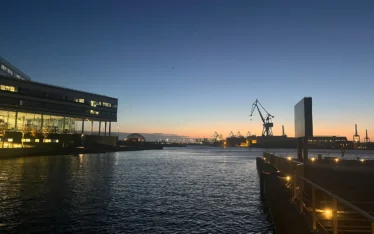Not Barbed, yet Borders
–
By Paul (pseudonym)
PhD student at the University of Southern Denmark.

Image generated by OpenAI’s DALL-E, used with permission.
In the span of half a day, I was transported from a world of crumbling sidewalks and absent signage to an alienating, protective bubble of a precision-driven island.
As the setting sun ignited patches of cloud, ablaze with the colors of wildflowers and the fading hues of autumn, the airplane approached Kastrup. The speaker crackled to life,
“Passengers on board, Air India’s flight AI 157 to København…”
Tears welled up in my eyes. It wasn’t sadness, nor joy. The past few months had been a whirlwind of application deadlines, rejection emails, immigration paperwork, and yes, multitudes of financial expenses.
Every so often, we hear news of some liberal Western country’s leader boasting the construction of a wall as the solution to most problems. However, this fence is rarely presented to us in totality, we catch glimpses of its various bits and pieces whenever they are in the news, be it Fortress Europe, the West Bank Barrier, Stop the Boats or the notorious Trump’s Wall. That’s not all. In each Indian metropolis, one would find barbed fenced palatial consulates of the West (in stark contrast to those nestled in Odense). Despite their rhetoric of affirmative action, fraternity and equality, these consulates are out of bounds for the general Indian public.
Which brings up the natural question: How did I get a visa if I did not visit a consulate? Describing the Agency’s office (to which the West outsource their submission and handling of the visa applications) would be: As I left the air-conditioned Agency’s office for the broiling street outside, I had to take care not to step over entire families sleeping on newspapers on the pavement, waiting for their chance – many lured by false promises by touts selling an easy passage into the gated West. This fragile glass wall constitutes a ‘wall’ as hard to cross as any boasted of by Western politicians. It seems that the whole point of outsourcing the visa submission to this external Agency is to remove this rendering of rustic life from the view of the Embassy’s gates, which would make for poor optics. Allegations of predatory practices, monopoly, and mistreatment abound, but the bottom line remains: You want to study in the West? Apply for a visa, and apply there.
On one hand, one cannot blame the citizens of the West, fed with reports of deviant behaviour by immigrants (dwelling on these would be several PhD theses in itself). The International Staff Office at the university cannot be blamed too; they did their best to help me navigate the process. The same for SIRI. Mentioning this issue with my supervisors, they revealed their side of the story: their mailboxes are inundated by entreaties from prospective students from the global South, one likening it to a ‘Denial-of-Service’ attack. At departmental forums, employees were categorically told not to respond to emails regarding potential employment, wary of phishing attempts.
Darkness had descended by the time I cleared immigration and reached Kastrup station. The immigration officer, with a firm face and dry voice, had demanded to see the funding agreement as proof of means of financial sustenance in Denmark. Back in India, the paramilitary, which doubles up as immigration officers, treats anyone with a particular choice of faith as refugees from Afghanistan or Rohingyas.
The world has, indeed, become a small place. In the span of half a day, I was transported from a world of crumbling sidewalks and absent signage to an alienating, protective bubble of a precision-driven island. The sky up was clear, cloudless, but menacing, devoid of the comfort of the moon. Amidst the darkness, a solitary star flickered wildly on the Northern horizon due to turbulence, seeming to beckon me with a twinkle – ‘Follow me, and I will get you through.’
Author Bio
Paul is a PhD student enrolled at Syddansk Universitet. He tries to balance academic activities with biking and rowing, when the weather permits, or blitzkrieging Agatha Christie novels when it is typical Danish weather outside.








